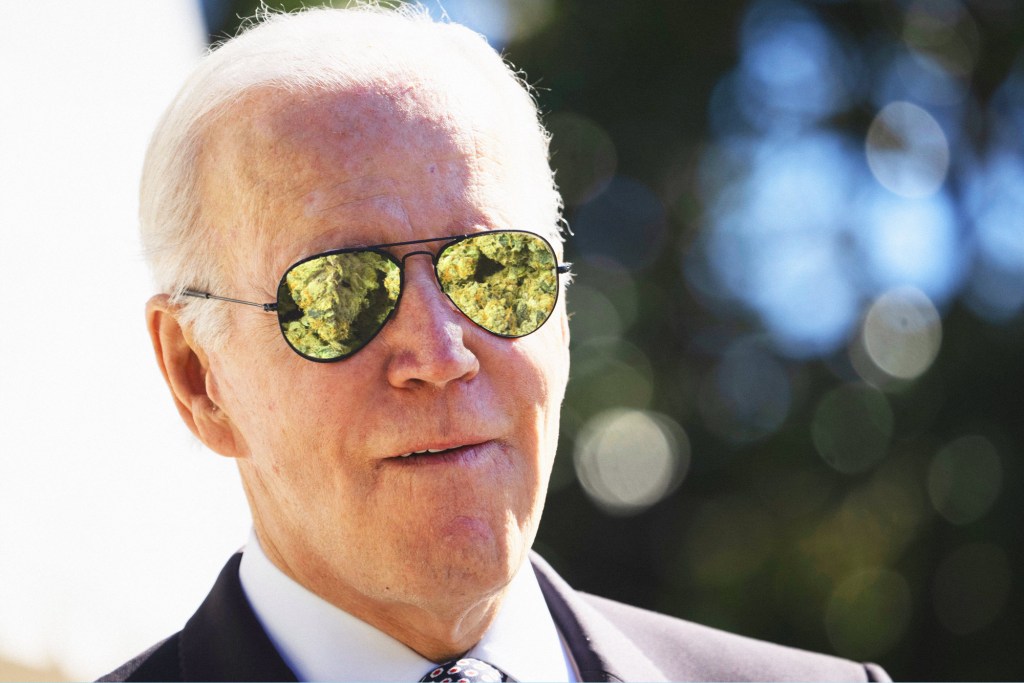US President Joe Biden has made the surprise announcement that he will seek to pardon people convicted of federal cannabis possession.
He has also called on state governors to do the same while announcing he would be seeking advice on how to reschedule cannabis under federal law.
The US, being a federated system, has multiple levels of government with differing drug laws. Cannabis, while legal in 19 states for recreational use and a further 18 for medicinal use, is still illegal at a federal level.
Biden has said that he will seek to correct that, announcing the news in a series of tweets.
“As I’ve said before, no one should be in jail just for using or possessing marijuana,” he wrote. “Today, I’m taking steps to end our failed approach”.
First: I’m pardoning all prior federal offenses of simple marijuana possession. There are thousands of people who were previously convicted of simple possession who may be denied employment, housing, or educational opportunities as a result. My pardon will remove this burden.
— President Biden (@POTUS) October 6, 2022
Biden’s move to “pardon all prior offences of simple marijuana possession” would see thousands of people with federal convictions no longer be denied employment, housing, educational opportunities, or the right to vote.
In one of the biggest shifts in US federal government drug policy in decades, Biden’s called for a review into how cannabis is scheduled under US law fulfills one of his key election pledges. Reclassifying the drug would not immediately mean legalised recreational use, but it would start the legal cogs turning toward that end.
Changes to law enforcement, employment practices, and other individual penalties would be reviewed and overturned, freeing up millions of Americans who use cannabis.
The move is supported by an overwhelming majority of Americans, who believe that cannabis use should not be a criminal issue.
The pardons would see more than 6,500 people potentially released from prison or have their criminal convictions wiped, according to the White House.
“Sending people to jail for possessing marijuana has upended too many lives – for conduct that is legal in many states,” Biden wrote. “That’s before you address the clear racial disparities around prosecution and conviction. Today, we begin to right these wrongs”.
The impact that drug laws have on people of colour and low-income individuals in the United States has been well documented.
Al Sharpton, president of the National Action Network civil rights group, weighed in with his comments that, “The United States will never justly legalise marijuana until it reckons with the outdated policies that equated thousands of young Black men with hardened drug pushers.”
“They were thrown behind bars for years on end for simple possession, a non-violent offense, for a substance that red states and blue states are now legalizing at a furious clip.”
Currently, the US federally classifies cannabis in the same Schedule One category that heroin and LSD fall into. It’s classified higher than both fentanyl and meth.
Opening up federal legalisation would also have a huge impact on the US’s burgeoning cannabis industry, already worth US$33 billion. Because of its federal status, most major banks in the US will not take money from legitimate cannabis businesses, leaving many shops in legal states the target of crime.
In Australia, the Greens have made a recent push to legalise and regulate the production, sale, and consumption of cannabis, something that the Labor government has already pushed back on.
There were 71,151 cannabis-related attests in Australia in 2018-2019, according to the latest government statistics. 91% of these were “consumer arrests” while only 9% were “provider arrests.” This means the vast majority of cannabis arrests in this country are for people possessing or consuming small quantities of cannabis.
In announcing a legal pathway the party had identified to override state and territory laws on cannabis, Greens Leader Adam Bandt stated that the war on drugs has failed, that the current system drags people unfairly into criminality, and that it disproportionately affects Indigenous, low-income, and younger people.
These are similar problems that Biden is seeking to address in his latest intervention. At the time, commentators stated that Australia was not “being left behind,” as the Greens claim, given that only eight countries have legalised recreational use of the drug. Now that we will soon be able to add America to that list, it seems the time may well be near for a serious rethink of the way we police the use of this substance
Related: Thailand’s Approach to Cannabis Shows Australia Has a Lot of Growing Up to Do
Related: Our Drug Driving Laws Bar Medicinal Cannabis Users from the Road — This MP Is Trying to Change That
Read more stories from The Latch and subscribe to our email newsletter.

